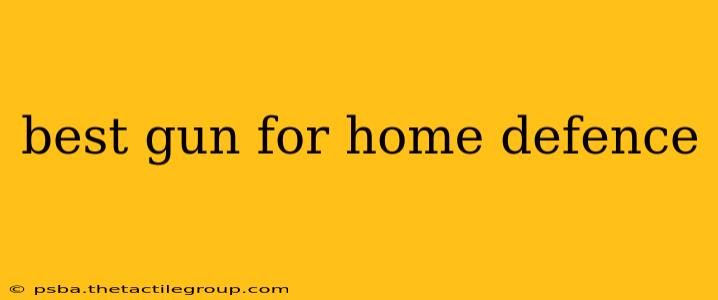Choosing the right firearm for home defense is a deeply personal and crucial decision. There's no single "best" gun, as the ideal choice depends heavily on individual factors like experience level, physical capabilities, and living situation. This guide will explore key considerations and popular options to help you make an informed decision. Remember, responsible gun ownership includes thorough training and understanding of relevant laws.
Key Factors to Consider
Before diving into specific firearms, let's examine the crucial elements influencing your choice:
1. Caliber and Ammunition:
- Stopping Power: Larger calibers generally offer greater stopping power, but recoil can be significant. Common choices include 9mm, .40 S&W, .45 ACP, and 12-gauge shotguns. Consider the trade-off between stopping power and manageable recoil.
- Ammunition Availability and Cost: Ensure readily available and affordable ammunition for your chosen caliber.
- Overpenetration: A critical concern, especially in densely populated areas. Smaller calibers generally penetrate less, reducing the risk of accidental injury to neighbors or family members.
2. Firearm Type:
- Handguns: Easy to handle and maneuver in confined spaces, but require greater accuracy and precision. Consider semi-automatic pistols for higher capacity.
- Shotguns: Excellent stopping power, especially with buckshot, but can be cumbersome and challenging to use accurately in tight quarters. Pump-action shotguns are reliable, while semi-automatic shotguns offer faster follow-up shots.
- Rifles: Offer the greatest range and accuracy, but their length makes them less ideal for close-quarters home defense. Consider a carbine-length rifle for better maneuverability.
3. Ergonomics and Reliability:
- Ease of Use: Choose a firearm that fits comfortably in your hand and is easy to operate under stress.
- Reliability: A malfunction during a home invasion could be catastrophic. Opt for a well-regarded, reliable firearm known for its consistent performance.
- Maintenance: Consider the firearm's ease of maintenance and cleaning.
4. Personal Experience and Training:
- Experience Level: Beginners should start with simpler firearms like handguns with lower recoil. Experienced shooters might opt for more advanced options.
- Training: Regardless of your experience, professional training is essential. Learn proper firearm handling, safe storage, and defensive tactics.
Popular Home Defense Options:
While there's no universal best gun, several consistently rank highly for home defense:
1. 9mm Semi-Automatic Pistols:
These offer a balance of manageable recoil, relatively high capacity, and good stopping power. They are popular choices for their ease of use and widespread availability.
2. 12-Gauge Pump-Action Shotguns:
The classic home defense firearm. Buckshot provides exceptional stopping power at close ranges. Their reliability and ease of maintenance are significant advantages.
3. AR-15 Style Carbines (in appropriate calibers):
While often debated, AR-15 style carbines in calibers like .223/5.56 offer superior accuracy and manageable recoil compared to larger calibers. Their modularity allows for customization to individual needs. However, these are generally not recommended for beginners.
Conclusion:
The "best" home defense firearm depends entirely on your individual circumstances and preferences. Thorough research, professional training, and careful consideration of the factors outlined above are paramount. Consult with experienced firearms instructors and professionals to make a well-informed decision that prioritizes safety and effectiveness. Remember that responsible gun ownership extends beyond the choice of firearm and includes safe storage, regular practice, and a deep understanding of the law.

